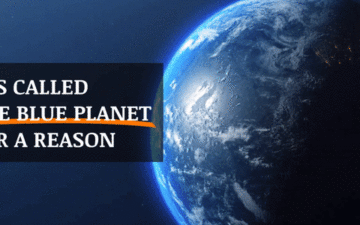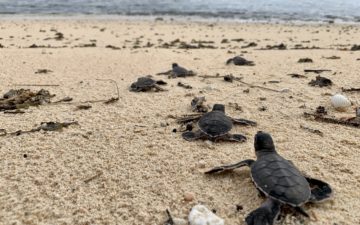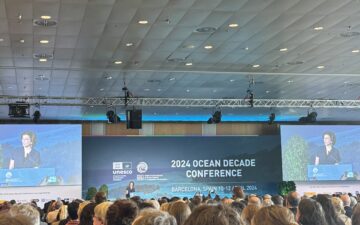By: Alexandra Kirby, Communications Intern, The Ocean Foundation
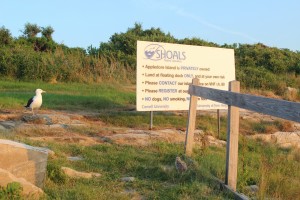
When I left for Shoals Marine Laboratory on June 29th, 2014, I did not know what I was getting myself into. I am from upstate New York, I am majoring in communication at Cornell University, and I can honestly say that, in my life, seeing open fields with grazing cows is more common than seeing marine life by the ocean. Nevertheless, I found myself headed to Appledore Island, the largest of the nine islands in the Isles of Shoals archipelago, six miles off the coast of the Maine, to learn about marine mammals. You might be wondering why a communication major from upstate New York would be interested in spending two weeks learning about marine mammals. Well, here’s the simple answer: I have come to love the ocean and I have come to understand the magnitude of how important ocean conservation really is. I know I have a ways to go, but, little by little, I am starting to learn more and more about ocean conservation and science communication.
I am headed down a path where I am finding myself combining my knowledge of communication and writing with my love for marine life and ocean conservation. Many people, possibly even yourself included, may very well question how someone like me can love the ocean when I have not been exposed to many aspects of various marine life and events. Well, I can tell you how. I found myself reading books and articles about the ocean and marine mammals. I found myself searching the Internet for current events and problems facing the ocean. And I found myself utilizing social media to retrieve information from ocean conservation nonprofits, like The Ocean Foundation, and government organizations, like NOAA. I didn’t have access to the physical ocean so I learned about it with the resources accessible (all of them examples of science communication).
After approaching a Cornell Marine Biology Professor about my concern combining writing with ocean conservation, he assured me that there is definitely a niche for communicating about ocean conservation. In fact, he told me it is greatly needed. Hearing this solidified my desire to become focused on ocean conservation communication. I had communication and writing knowledge under my belt, but I knew I needed some real marine biology experience. So, I packed my bags and headed to the Gulf of Maine.
Appledore Island was unlike any island I have ever been to before. On the surface, its few amenities looked underdeveloped and simple. However, when you came to understand the depth of technology to achieve a sustainable island, you would not think it so simple. By using wind, solar, and diesel generated power, Shoals produces its own electricity. To follow along the track towards a sustainable lifestyle, systems for wastewater treatment, fresh and saltwater distribution, and a SCUBA compressor are maintained.
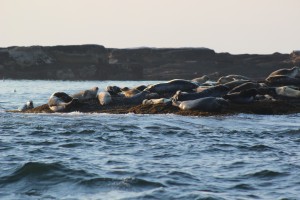
A sustainable lifestyle is not the only plus to Shoals. In fact, I think the classes have even more to offer. I participated in the Introduction to Marine Mammal Biology class taught by Dr. Nadine Lysiak from the Woods Hole Oceanographic Institute. The class aimed to teach students about the biology of marine mammals, focusing on whales and seals in the Gulf of Maine. The very first day, the entire class took part in a gray and harbor seal monitoring survey. We were able to conduct abundance counts and photo ID individual seals after taking pictures of the colony’s haul out sites. After this experience, I had extremely high hopes for the rest of the class; and I was not disappointed.
In the classroom (yes, we weren’t outside watching seals all day), we covered a wide array of topics including taxonomy and species diversity, morphological and physiological adaptations for life in the ocean, foraging ecology and behavior, reproductive cycles, bioacoustics, anthropogenic interactions, and management of threatened marine mammal species.
I learned more than I had ever hoped about marine mammals and the Isles of Shoals. We visited Smuttynose Island, and left with grand tales about pirate murders that occurred on the island not too long ago. The very next day we undertook the task of completing a harp seal necropsy. And even though birds are not marine mammals, I learned a bit more than I hoped about gulls, as there were many protective mothers and clumsy chicks roaming the island. The most important lesson was to never get too close (I learned the hard way – I was pooped on many times by the aggressive, and overly defensive, mothers).
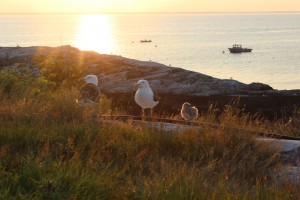
Shoals Marine Laboratory provided me with the extraordinary opportunity to study the ocean and the remarkable marine animals that call it home. Living on Appledore for two weeks opened my eyes to a new way of living, fueled by a passion to better the ocean and the environment. While on Appledore, I was able to experience authentic research and real field experience. I learned a great amount of detail about marine mammals and the Isles of Shoals and I glimpsed into a marine world, but I also kept thinking back to my communication roots. Shoals has now provided me with high hopes that communication and social media are powerful tools that can to be utilized to reach the general public and improve the public’s superficial understanding of the ocean and its problems.
Its safe to say I did not leave Appledore Island empty handed. I left with a brain full of knowledge about marine mammals, an assurance that communication and marine science can be combined, and, of course, gull droppings on my shoulder (at least its good luck!).
